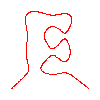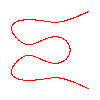| Course Content: |
This is serious course for serious students. It will cover the
same topics as the ordinary Math 151 (see their
schedule),
but at a distinctly higher level
without review, and with an emphasis on rigor.
These topics are vectors, functions, limits, derivatives, inverse functions, Mean Value
Theorem, applications of derivatives, integrals, and the Fundamental Theorem
of Calculus.
Because of this, the primary source material for the course are my lectures; the
book is supplementary, but well-worth reading, especially for its examples.
There will also weekly MATLAB work.
Octave is
supposed to be an open-source MATLAB clone.
|
| Special Note: |
You are the best of the best. I hope to make this course
intellectually interesting and challenging. There is no
predetermined grade distribution; your GPA will not be penalized for
taking this course. Good performance will be rewarded with good grades.
(Extra credit to the first student who explains properly to me what is
wrong with the common use of the word `curve' with respect to grades.)
Your goal in this course, as in every course that you ever
take, should be a complete mastery of the material. Anything less is
aspiring to mediocrity and doing yourself a disservice.
There are several things that I will expect from you.
You should read the relevant sections of the
text before we meet (if possible).
Come to class ready to ask questions about what you do not yet know.
After class, re-read the text and your notes,
and do some exercises to complete your mastery of the material.
A guide, and only a guide, to exercises for this purpose may be found
here.
Finally, ask questions in class, lots of them.
|
 Office: Milner 303
Office: Milner 303  Telephone: 845.4169
Telephone: 845.4169  email: sottile@math.tamu.edu
email: sottile@math.tamu.edu WWW:
Sottile's home page
WWW:
Sottile's home page











